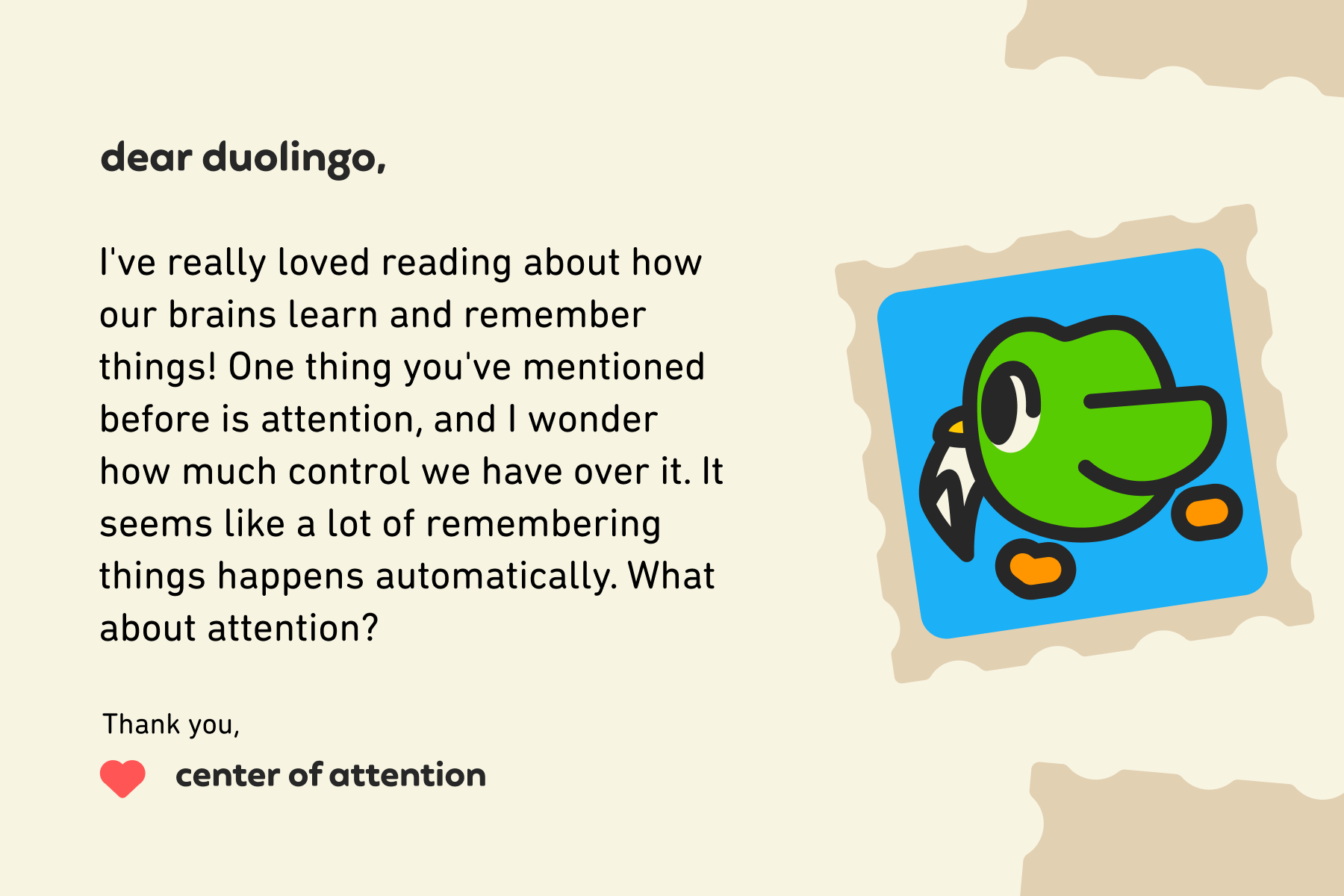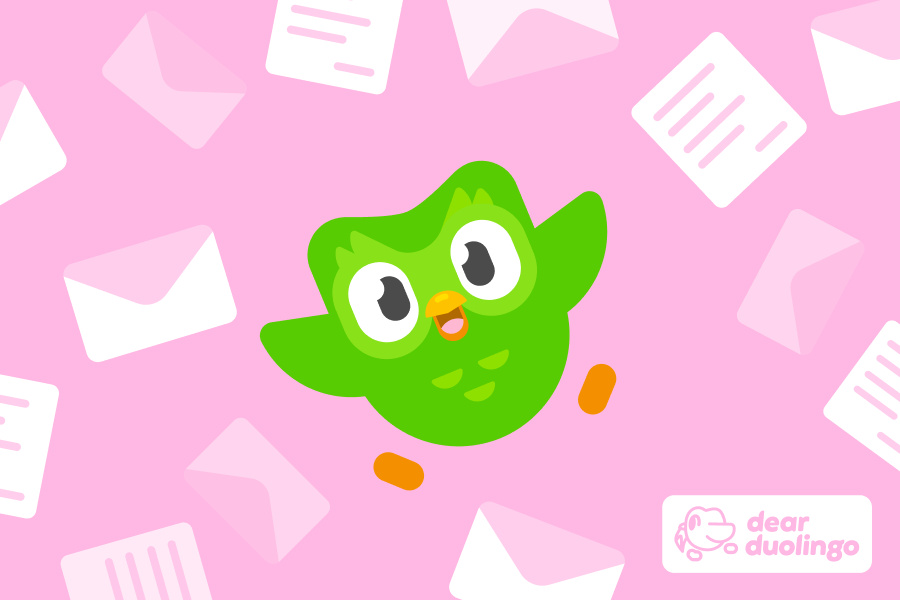Welcome to another week of Dear Duolingo, an advice column just for language learners. Catch up on past installments here.
Hi, everyone! I'm Dr. Ryan Peters, and I'm a learning scientist here at Duolingo. My background is in how learning happens in our brain and the processes that lead to learning. I do a lot of research here about the effectiveness of Duolingo courses and features, and this week I'm taking over Dear Duolingo to answer a question that is right up my alley!
Our question this week:

This is a great insight: Our brains are hardwired to do all kinds of things—including store memories and pay attention—but we do have *some* control!
Let's examine a common situation that requires more attention than you might realize: being in a coffee shop. There's a lot going on! There's customers and staff, the menu, the smell of the drinks, the paintings on the wall, etc. But as you prepare to order, the menu comes into focus and everything else in the room fades into the background. You then look at the barista and say your order. Perhaps as you prepare to pay, a friend calls out your name, briefly distracting you. You tell them to hold on and then turn back to the barista to finish ordering.
In order to successfully get your iced mochaccino with oat milk, you have to focus your attention on one thing to the exclusion of others: first on the menu and then to the barista, and in the meantime you have to ignore your surroundings in the cafe. You subconsciously directed your attention to certain parts of the environment, but also had your attention diverted when your friend called out to you. Whew!
What are our brains doing when they pay attention?
Attention is the process of focusing on one thing deeply to the exclusion of others. When it was your turn to order, your brain both increased focus on the barista and suppressed other parts of the environment. Your brain notices and stores what's of interest, and that information gets processed across more areas of the brain. Attention has a real, physical impact on the brain, one that can be seen in brain scans.
Attention helps you and your learning by avoiding information overload and prioritizing new, interesting, or useful information. Since paying attention to something boosts its signal in the brain, chances are higher that something will be remembered in the future.
That's why in your Duolingo course, each lesson focuses on just a couple of related topics at a time. There are certain details we want learners to notice and pay attention to, like new vocabulary or improper fractions. If learners don’t notice those details—if they focus on the paintings on the wall instead of the menu—they won’t remember and learn what's most important!
How do our brains know what to pay attention to?
And, maybe just as important: How do our brains know what to ignore?
We've spent our whole lives training our brains what to attend to and what to ignore depending on the situation. Some things we pay attention to because they might help us survive—like objects and animals that are big, bright, or looming. Other things we've learned to pay attention to because they help us reach a shorter-term goal, whether that's which kind of coffee makes us feel most alert or how much pressure on the brakes is necessary to come to a gradual stop.
Here are a few characteristics our brain can't help but pay attention to:
- Routine and familiarity. Our brains develop habits that can be hard to break. If we repeatedly pay attention to something in familiar situations, our brains get used to it.
- Things that reward us. Our brains love to get what they want, so getting positive reinforcement tells our brain that what it paid attention to was worth it!
- Patterns. Our brains are constantly crunching numbers and looking for patterns in the world around us.
- What seems to matter. Our brains direct their attention to different things based on instructions and context.
- Things that stand out. Our brains pay attention to things that are salient—so things that are obvious, highlighted, or contrast with other things in our environment.
How to pay attention better
So much of attention has to do with how our brain is built, but there's still a lot of directing and reinforcing we can do!
- Notice when you're at your best. Are you a morning person? Most focused with some ambient noise? Figure out when your good moments are, and capitalize on them! Give yourself every chance to control when your study time happens. That's why cramming isn't good for long-term learning: You're forced to do it at the last opportunity, whenever that is, even if it's not when you are at your best!
- Develop consistent study habits. To help you focus on what matters, reduce distractions and make your learning environment predictable for your brain. Try studying in similar places and at the same time of day, and learn how to limit the most tempting distractions.
- Do an "attention audit." What gets your attention wandering? Reflect on what you can ignore easily and what lures you away from a task. For me, it's the TV—I just can't *not* pay attention to the TV, no matter what's on! 😅
- Make your phone work for you. Your phone doesn't have to work against you as a distraction! Try out some of the built-in functionalities to help manage how they attract your attention. For example, in the settings menu, change your Duolingo practice reminders to the time that best suits you. You can also use your phone's "do not disturb" mode or disable notifications for particular apps when you need focus time. Our habits and environment can be hard to change, so learn what you can control!
- Be intentional about your study time. Before you start a Duolingo lesson, pull out your electric guitar, or sharpen your pencil, identify what your end goal of the day is and what you'll need to do to get there. This works the same way as study guide questions before a test or what you sometimes see at the start of a textbook chapter. This is called metacognition—thinking about how you think—and this intentionality helps to clarify what you want to pay attention to.
- Gamify your learning! Study hard, and play hard, too! You can gamify your attention by finding some way to make it interesting to you, especially when it's hard to pay attention like in a meeting or lecture. For example, some writers really like the pomodoro method, in which you write for 25 minutes and take a break for 5—which gives you a short-term goal and can keep you from feeling overwhelmed.
Focus on what matters!
Attention helps us grasp the most important parts of new information… as long as we can keep from getting distracted! Understanding what tempts you away from your goals can really help you manage your learning environment and set yourself up for success.
For more answers to your questions about learning and the brain, get in touch with us by emailing dearduolingo@duolingo.com.



